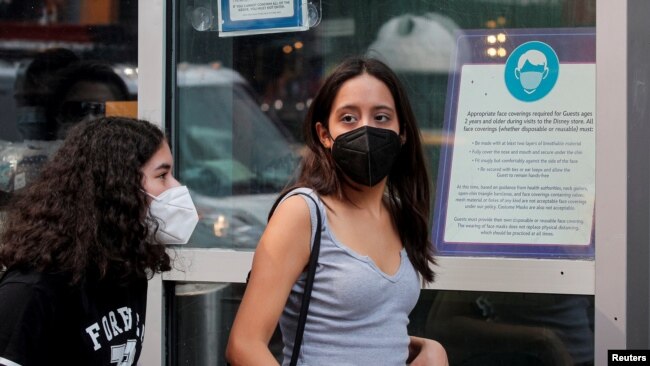デルタ変異種 AY.4.2の脅威
デルタ、厄介極まりない変異種ですが、それよりも容易に拡散する可能性の証拠があるというさらに厄介なAY.4.2。
The world remains easily hurt by the virus.だそうです。
ラストセンテンスに驚愕しています!!
どうです?この恐怖!!まだまだ続くと!!
根元はどこから?誰から?何から?どこで?何が?
全く解明されずに、変異種のみが広がり続ける現状。
新種に効くワクチン開発が待たれます。
VOAで英語を学び、世界の今を知りましょう!!
研究者が注目するデルタ変異種の変化 (和訳)
Scientists Watching Delta Variant for Changes
SARS-CoV-2ウイルスのデルタ変異種が、世界のコロナウイルス感染症のほとんどの原因であると科学者たちは言います。COVID-19ワクチンは、これまでのところ、この変種に対してよく効いています。専門家によれば、ワクチンを接種した人が感染しても、入院したり死亡したりすることはほとんどないといいます。しかし、科学者たちはデルタの変化を注意深く見守り続けています。
デルタ
2020年12月にインドで初めて確認されたデルタ変異種は、SARS-CoV-2ウイルスの中でも最も厄介な種類です。
世界保健機関(WHO)は、デルタを”懸念される変異種”と表現しています。それは、この変種が病気の広がりを増大させたり、より重篤な病気を引き起こしたり、ワクチンや治療法の効果を低下させたりする可能性があることを意味します。
Shane Crottyシェーン・クロッティ氏は、サンディエゴにあるラホーヤ免疫学研究所のウイルス専門家です。彼は、デルタの拡散能力を "スーパーパワー "と表現しました。
the U.S. Centers for Disease Control and Preventio米国疾病予防管理センターによると、デルタはオリジナルのSARS-CoV-2の変異種に比べて2倍以上の速さで拡散することができるといいます。研究によれば、初期のウイルスに比べて、感染者が病院に運ばれる可能性が高いとい指摘しています。
また、デルタは、オリジナルのSARS-CoV-2よりも2〜3日早く症状が出るため、免疫システムが防御するための時間が短くなります。
デルタウイルスに感染した人の鼻の中には、初期型のコロナウイルスに比べて約1200倍のウイルスが存在します。ワクチンを接種した人がデルタに感染した場合のウイルスの量は、ワクチンを接種していない人とほぼ同じです。また、ワクチンを接種した人もしていない人も、他の人にウイルスを感染させる可能性があります。
しかし、ワクチンを接種した人の場合は、ウイルスの量がより早く減少するため、より短期間にウイルスを拡散する可能性が高いのです。
WHOによると、公的データベースに報告されたコロナウイルス感染症の全遺伝子サンプルの99.5%をデルタが占めているといいます。
しかし、南米では、デルタの広がりが遅いため、ガンマ、ラムダ、ミューなどの他の変異種が、報告された症例の多くを占めています。
ワクチンの専門家の多くは、今後の変異種はすべてデルタから発展すると予測しています。その一つがAY.4.2と呼ばれる変異種です。英国では、この変種はウイルスサンプルの10%を占めています。
英国政府の健康安全局は、このAY.4.2を "Variant Under Investigation "と名付けました。関係者によると、初期の研究では、この変異種はデルタと比較してワクチンの効果を大幅に低下させないことが示唆されています。しかし、AY.4.2は旧型のデルタよりも容易に拡散する可能性があるという証拠があると同機関は述べています。
AY.4.2は、米国を含む少なくとも42カ国に広がっています。
今後も増える?
ウイルスの専門家たちは、デルタの進化を注意深く見守っています。
現在のワクチンは、重症化や死亡を防ぐものではありますが、感染を防ぐものではありません。完全にワクチンを接種していても、ウイルスを保有し、感染する可能性があるのです。
メイヨー・クリニックのワクチン開発者であるDr. Gregory Polandグレゴリー・ポーランド博士は、SARS-CoV-2に対抗するために必要なのは、ウイルスの拡散を阻止することもできる新しい種類のワクチンである可能性が高いと述べています。ポーランド博士をはじめとする専門家によれば、それまでは、世界は依然としてウイルスの被害を受けやすい状態にあるといいます。
Scientists Watching Delta Variant for Changes
The Delta variant of the SARS-CoV-2 virus is responsible for most cases of coronavirus infections worldwide, scientists say. The COVID-19 vaccines work well against the variant so far. Fully vaccinated people who get infected rarely require hospital stays or die from the disease, medical experts say. But scientists continue to watch Delta closely for changes.
Delta
The Delta variant, first identified in India in December 2020, remains the most troubling kind of SARS-CoV-2 virus.
The World Health Organization describes Delta as a variant of concern. That means the variant can increase disease spread, cause more severe disease or reduce the effects of vaccines and treatments.
Shane Crotty is a virus expert at the La Jolla Institute for Immunology in San Diego. He described Delta’s ability to spread as a “superpower.”
Delta is able to spread more than two times faster than other SARS-CoV-2 variants, says the U.S. Centers for Disease Control and Prevention. Studies suggest it may be more likely to put infected people in the hospital than earlier forms of the virus.
Delta also can cause symptoms two to three days sooner than the original SARS-CoV-2, giving the immune system less time to put up a defense.
People infected with Delta carry around 1,200 times more virus in their noses compared with the first kind of the coronavirus. The amount of virus in vaccinated individuals who become infected with Delta is about the same as those who are unvaccinated. And both vaccinated and unvaccinated people can spread the virus to others.
In vaccinated people, however, the amount of virus drops more quickly, so they likely spread the virus for a shorter time.
The WHO says Delta makes up 99.5 percent of all genetic samples of coronavirus infection reported to public databases.
However, in South America, where Delta has spread more slowly, other variants such as Gamma, Lambda and Mu still make up a large number of reported cases.
Many vaccine experts predict that all future variants will develop from Delta. One such variant is known as AY.4.2. In Britain, the variant represents 10 percent of virus samples.
The British government’s health security agency has named the AY.4.2 a "Variant Under Investigation." Officials say an early study suggests the variant does not substantially reduce vaccine effectiveness in comparison to Delta. However, there is some evidence that AY.4.2 could spread more easily than the older Delta, the agency said.
AY.4.2 has spread to at least 42 countries, including the United States.
More on the way?
Virus experts are closely watching the evolution of Delta.
While current vaccines prevent severe disease and death, they do not block infection. A person can be fully vaccinated and still carry and pass the virus.
What is needed to defeat SARS-CoV-2 is likely a new kind of vaccine that also blocks virus spread, said Dr. Gregory Poland, a vaccine developer at the Mayo Clinic. Until then, Poland and other experts say, the world remains easily hurt by the virus.
Words in This Story
variant – n. different in some way from others of the same kind
symptom – n. a change in the body or mind which indicates that a disease is present
evolution – n. a process of change in a certain direction
